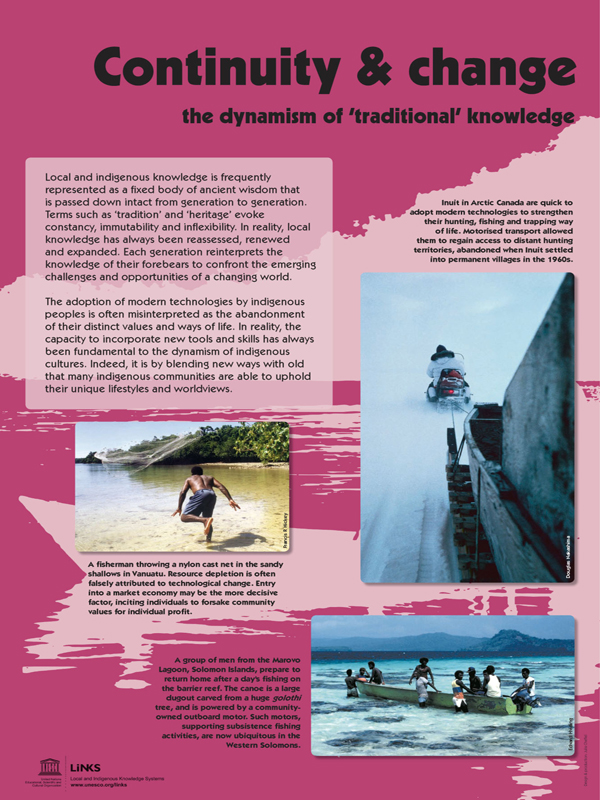Indigenous Knowledge posters
A series of seven indigenous knowledge posters was launched by the LINKS Programme at the National Cultural Centre of Vanuatu in December 2008. These posters introduce important concepts and issues relating to knowledge in indigenous societies today. They are illustrated with case studies and images from around the world. The posters serve as a learning resource that strengthens awareness of the many opportunities and challenges facing indigenous knowledge holders. They may be used in a variety of educational settings within schools or the community.
The posters are available (in PDF) in Bislama (Vanuatu), English, French, Russian and Spanish languages. Localized editions of the posters have been produced in the Philippines, where an English-language local edition has been published by indigenous NGO, Tebtebba with a Philippine language version to be developed in 2011.
To order hardcopies (size: 47cm x 68cm), email links(at)unesco.org
Strong roots for sustainable development This knowledge is integral to a cultural complex that also encompasses language, systems of classification, resource use practices, social interactions, rituals and spirituality. These unique ways of knowing are important components of the world’s cultural diversity, and provide a foundation for locally-appropriate sustainable development. Download [PDF 1.9Mb | JPG 528Kb]
| |
Gender & knowledge complementary ways of knowing Indigenous knowledge research has mainly focused on knowledge held by men. Today, it is recognised that the two ways of knowing complement each other and that they are both essential to the continuing vitality and dynamism of indigenous knowledge systems. Download [PDF 2.7Mb | JPG 610Kb]
| |
Challenging the assumptions of western science Unlike science, indigenous thought does not oppose the rational and the spiritual, nor value one above the other. Instead, they flow together and intermingle. For this reason, efforts to extract indigenous knowledge from its moral and spiritual foundations often result in its misinterpretation and fragmentation. Download [PDF 2.5Mb | JPG 515Kb]
| |
Continuity & change the dynamism of ‘traditional’ knowledge The adoption of modern technologies by indigenous peoples is often misinterpreted as the abandonment of their distinct values and ways of life. In reality, the capacity to incorporate new tools and skills has always been fundamental to the dynamism of indigenous cultures. Indeed, it is by blending new ways with old that many indigenous communities are able to uphold their unique lifestyles and worldviews. Download [PDF 1.7Mb | JPG 422Kb]
| |
Synergies between scientific & indigenous knowledge The recognition that local and indigenous peoples have their own ecological understandings, conservation practices and resource management goals has important implications. It transforms the relationship between biodiversity managers and local communities. While previously they were perceived simply as resource users, indigenous peoples are now recognised as essential partners in environmental management. However, differences between scientific and indigenous worldviews continue to create barriers to meaningful collaboration, as does the widespread assumption that science is superior to other knowledge systems. Download [PDF 2Mb | JPG 614Kb]
| |
Protecting indigenous knowledge from inappropriate use Today, many communities are calling for the protection of their knowledge from inappropriate use, emphasising the need for prior informed consent and the sharing of benefits. However, existing regimes for protecting intellectual property are ill-adapted to indigenous knowledge and the needs of indigenous societies. Efforts are being made to develop more appropriate methods, such as sui generis systems based upon customary law. Download [PDF 2.2Mb | JPG 645Kb]
| |
Revitalising knowledge transmission within indigenous communities With formal education, children spend much time learning passively in classroom settings, rather than engaged in hands-on learning on the land. Teachers replace parents and elders as the holders of knowledge and authority. National languages become the medium of instruction, while vernacular languages are sidelined. Formal education may therefore contribute to an erosion of cultural diversity, a loss of social cohesion and the alienation and disorientation of indigenous youth. There is an urgent need to enhance the intergenerational transmission of indigenous knowledge, as a complement to mainstream education. Efforts are now being made to bring indigenous language and knowledge into school curricula, and to move learning back into the community, thus reaffirming the status of elders as knowledge holders. |













